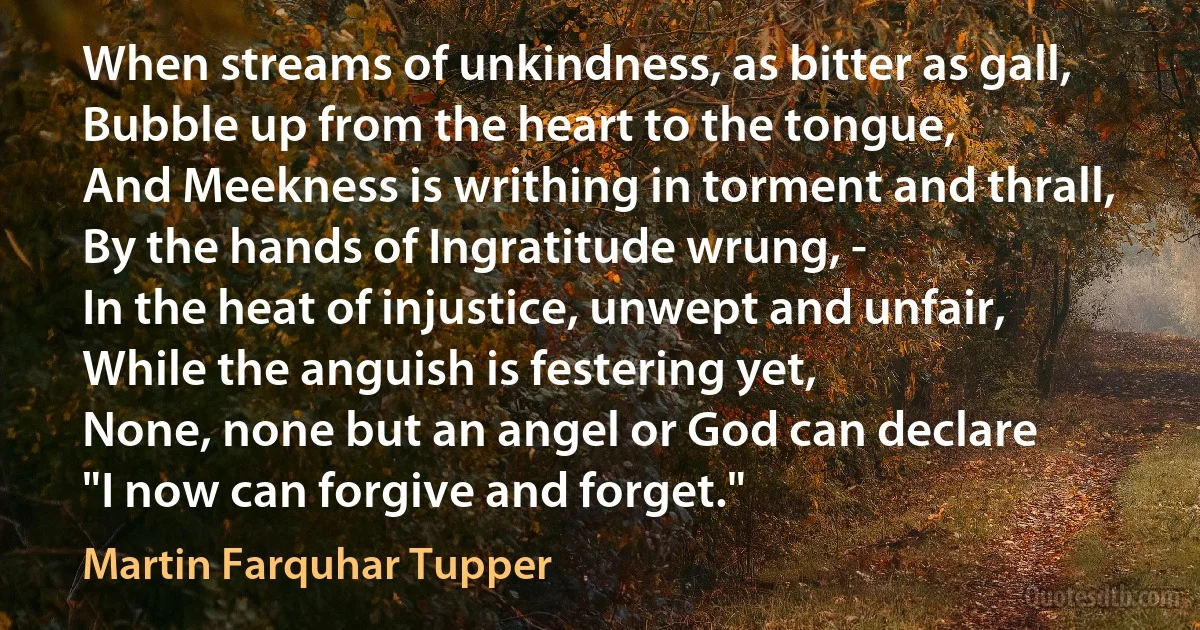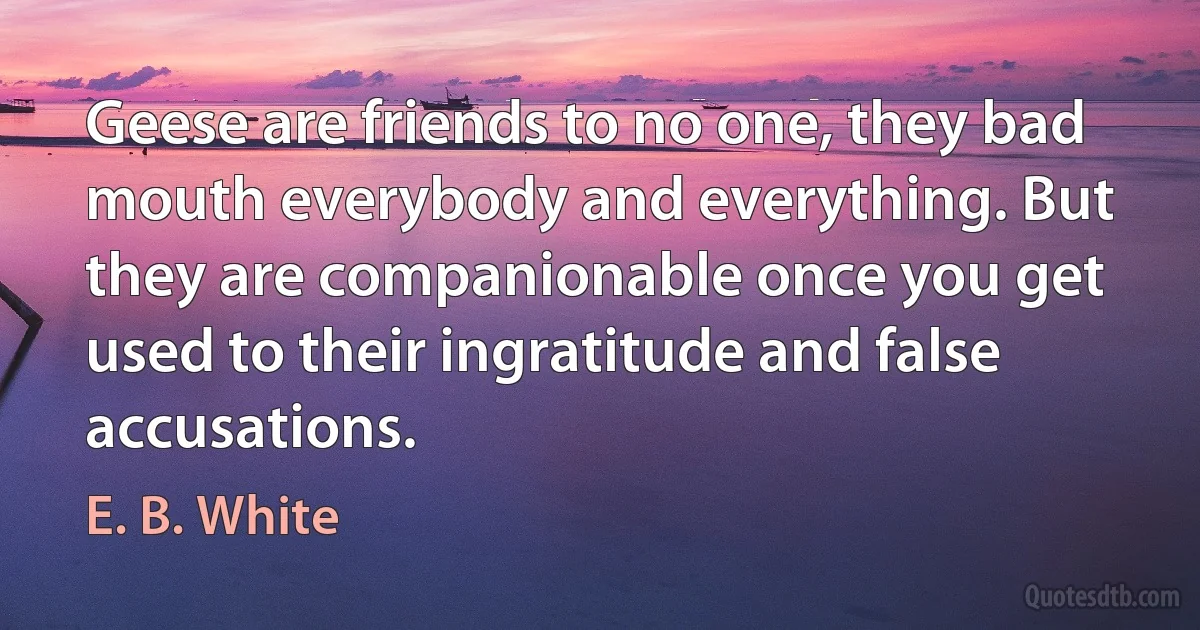Ingratitude Quotes - page 2
Habit... makes the endurance of evil easy (which, under the name of patience, is falsely honored as a virtue), because sensations of the same type, when continued without alteration for a long time, draw our attention away from the senses so that we are scarcely conscious of them at all. On the other hand, habit also makes the consciousness and the remembrance of good that has been received more difficult, which then gradually leads to ingratitude (a real vice). [...] Acquired habit deprives good actions of their moral value because it undermines mental freedom and, moreover, it leads to thoughtless repetitions of the same acts (monotony), and thus becomes ridiculous.

Immanuel Kant
God gave us minds to think with and hearts to thank with. Instead we use our hearts to think about the world as we would like it to have been, and we use our minds to come up with rationalizations for our ingratitude. We are a murmuring, discontented, unhappy, ungrateful people. And because we think we want salvation from our discontents.

Douglas Wilson
[the foreign Muslims (or Turks)] "alone are capable of virtue, kindness, generosity, valour, good deed, good works, truthfulness, keeping of promises... loyalty, clarity of vision, justice, equity, recognition of rights, gratitude for favours and fear of God. They are, consequently, said to be noble, free born, virtuous, religious, of high pedigree and pure birth. These groups, alone are worthy of offices and posts in the government... Owing to their actions the government of the king is strengthened and adorned.” [On the other hand the] "low-born” (Indian) Muslims are capable only of vices - immodesty, falsehood, miserliness, misappropriation, wrongfulness, lies, evil-speaking ingratitude,...shamelessness, impundence... [So they are called] low-born, bazaar people, base, mean, worthless, plebian, shameless and of dirty birth”.

Ziauddin Barani
According to the people who dearly would love to throw him out of office, Barack Obama was elected to be 'above politics.' He wasn't elected to be president, after all. He was elected as an avatar of American tolerance. His attempts to get himself reelected imply a certain, well, ingratitude.

Charlie Pierce
Actually we were brought up to ingratitude - a relentless training through which we were taught to find nothing whatever good in ourselves, whether natural or spiritual.. Conquering pride and conceit, they called it, practising humility, self-praise is no praise - all very well...Was pride really crushed by all this snubbing and humiliation? Was it not rather repressed...Worse still, we learnt this way to cultivate the devil's mirror eye of Hans Andersen's Snow Queen, over-vigilant, super-critical sight, sharpened to discover the worm in every bud, even the tiniest plant-louse! For if one practises this sort of discipline on oneself, day and night, it is asking too much - at any rate of a young girl - to judge one's neighbour by another yard-stick. All the time one's lynx-eyed consciousness remained on the alert, quick to pounce on everything negative - in you and in myself...Hans Andersen well knew how near this attitude is to blasphemy.

Ida Friederike Görres
But thoughtless ingratitude is the armour of the young; without it, how would they ever get through life? The old wish the young well, but they wish them ill also: they would like to eat them up, and absorb their vitality, and remain immortal themselves. Without the protection of surliness and levity, all children would be crushed by the past - the past of others, loaded on their shoulders. Selfishness is their saving grace.

Margaret Atwood
The fury of Almighty God against evil is evidence of his goodness. If he wasn't angered, he wouldn't be good. We cannot separate God's goodness from his anger. Again, if God is good by nature, he must be unspeakably angry at wickedness. But his goodness is so great that his anger isn't confined to the evils of rape and murder. Nothing is hidden from his pure and holy eyes. He is outraged by torture, terrorism, abortion, theft, lying, adultery, fornication, pedophilia, homosexuality, and blasphemy. He also sees our thought-life, and he will judge us for the hidden sins of the heart: for lust, hatred, rebellion, greed, unclean imaginations, ingratitude, selfishness, jealousy, pride, envy, deceit, etc. Jesus warned, "But I say to you, that every idle word that men shall speak, they shall give account thereof in the day of judgment.”.

Ray Comfort
Hero demolished both his friends and his soldiers, who had helped him in the execution of his plans; he found new friends, and raised other troops. I say, in spite of Machiavel and of the ingrates, that this policy of Hero is very bad, and that it is much more prudent to trust the troops which have tested and known value, and have friends whose loyalty has also been tested. The new and unknown ones are also unsafe. I leave the reader to push this reasoning further; all those who detest ingratitude, and who truly value friendship, will not remain neutral on this matter.

Frederick II of Prussia
If nature has been frugal in her gifts and endowments, there is the more need of art to supply her defects. If she has been generous and liberal, know that she still expects industry and application on our part, and revenges herself in proportion to our negligent ingratitude. The richest genius, like the most fertile soil, when uncultivated, shoots up into the rankest weeds; and instead of vines and olives for the pleasure and use of man, produces, to its slothful owner, the most abundant crop of poisons.

David Hume
Ingratitude is amongst them a capital crime, as we read it to have been in some other countries: for they reason thus; that whoever makes ill-returns to his benefactor, must needs be a common enemy to the rest of the mankind, from where he has received no obligations and therefore such man is not fit to live.

Jonathan Swift
Blow, blow, thou winter wind, Thou art not so unkind As mans ingratitude Thy tooth is not so keen, Because thou art not seen, Although thy breath be rude. Heigh-ho sing, heigh-ho unto the green holly Most friendship is feigning, most loving mere folly. Then heigh-ho the holly This life is most jolly. Freeze, freeze, thou bitter sky, That dost not bite so nigh As benefits forgot Though thou the waters warp, Thy sting is not so sharp As friend rememberd not.

William Shakespeare



